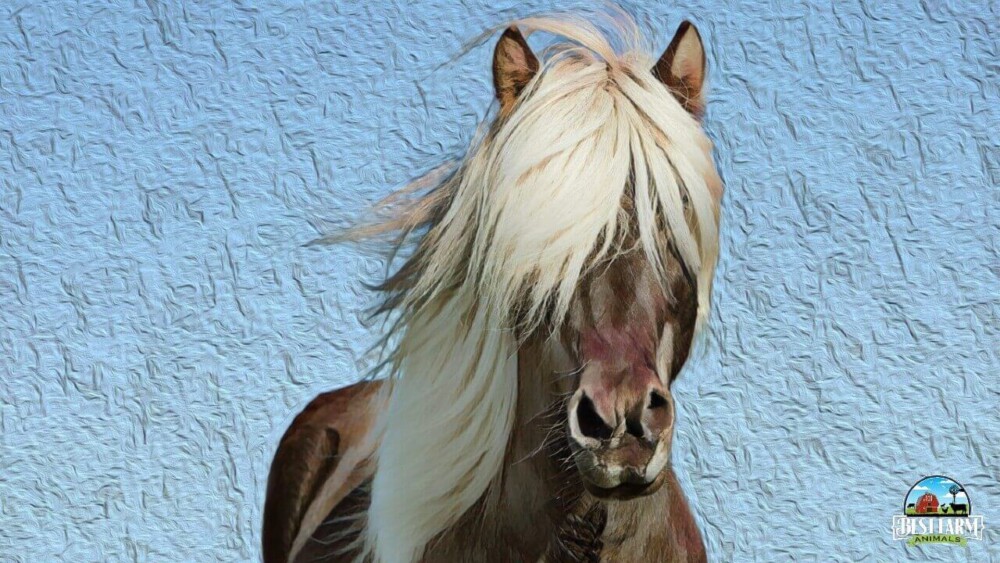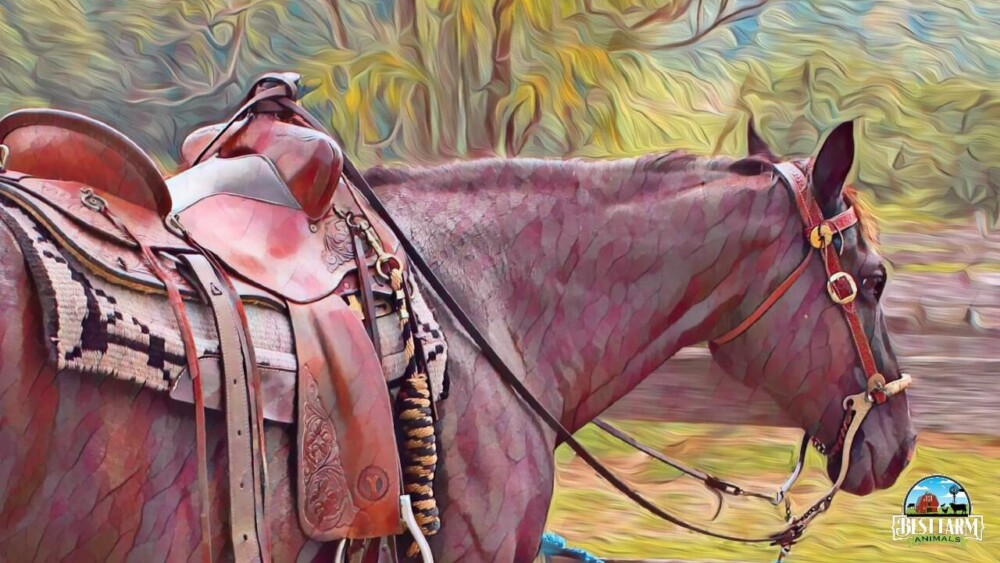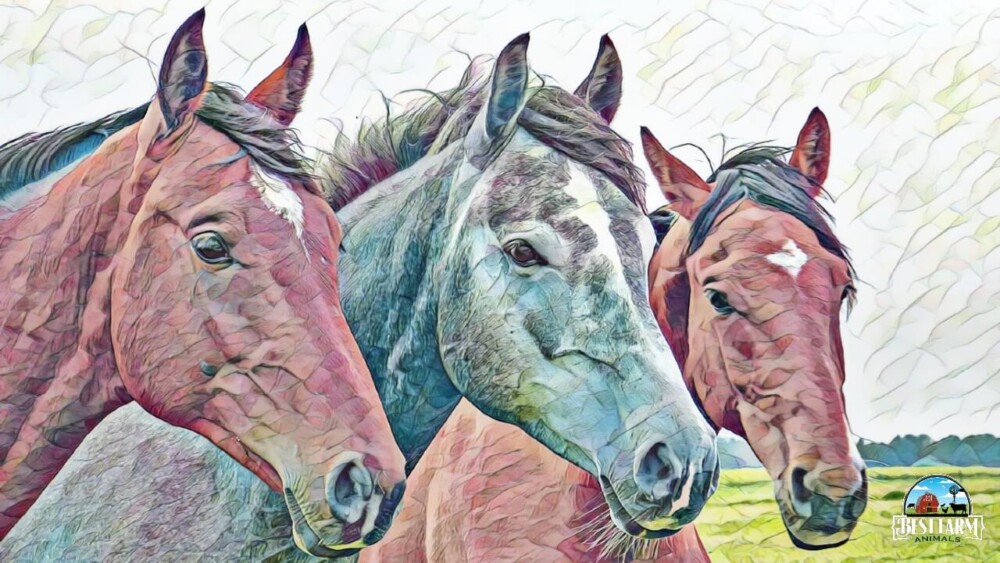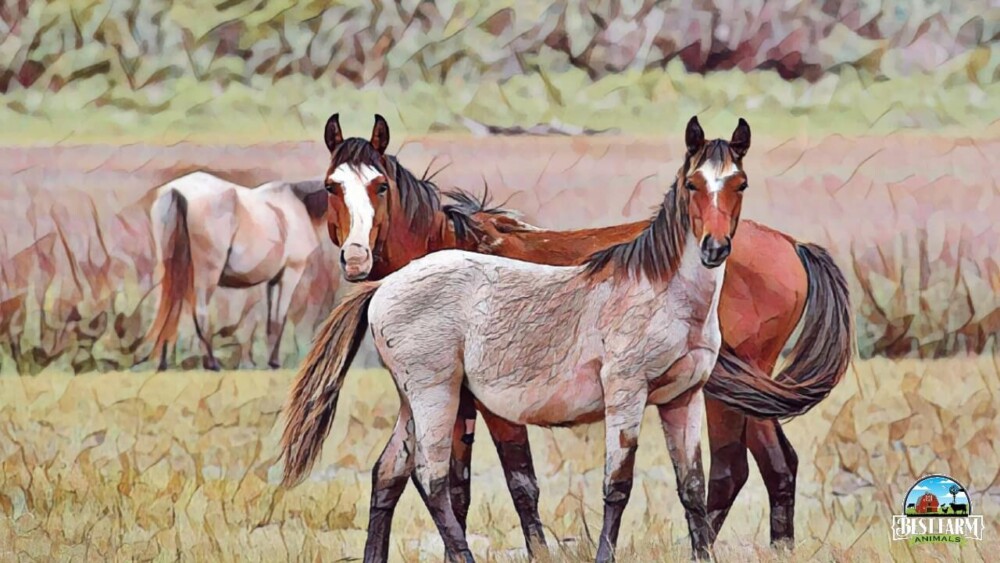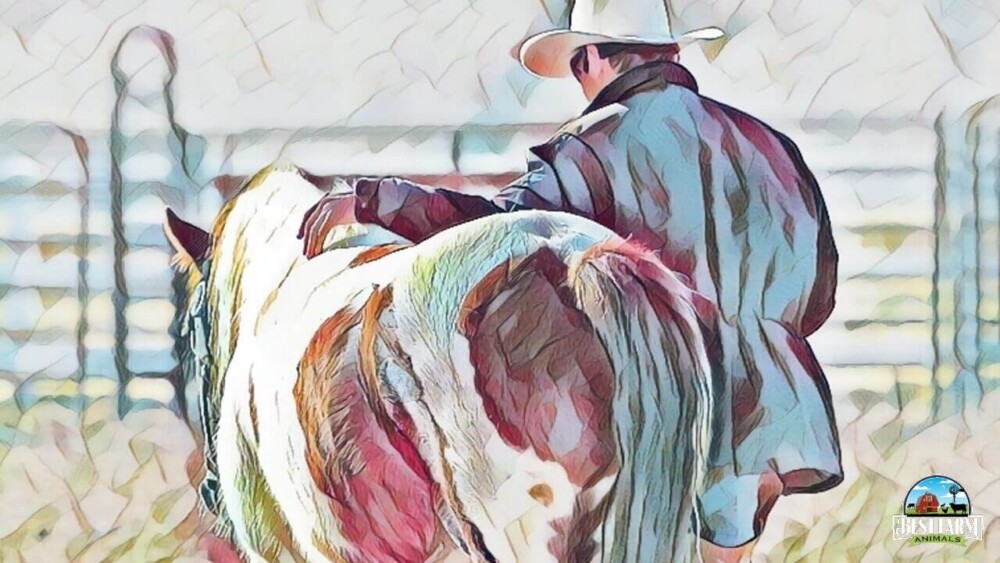Colic is a worry for many horse owners. When my horse got colic, I was terrified. That’s because colic can be fatal. Plus, I could tell that my horse was in pain and uncomfortable. And, I worried about the other issues that colic can cause. You may relate horse colic to human colic, but colic isn’t always what you think it is.
What is Horse Colic? What equine vets call colic is not the same as human colic. Horse colic is something very different and could point to a dangerous health condition. Horse colic is defined as abdominal pain and is a symptom rather than a condition. It’s usually a sign of gastrointestinal issues. Some of which have no obvious cause, and others a specific diagnosis. It can also be a sign of some non-gastrointestinal illnesses that cause pain in the stomach.
In fact, there are over 70 different conditions that can cause colic in horses. They range from non-serious to life-threatening. Due to its broad nature, owners must understand as much about colic as possible.
This article will explain all aspects of horse colic, including the different types, symptoms, treatments, and more. We will also clear up some of the myths surrounding horse colic and answer the most frequently asked questions about it.
Horse colic is fairly common, with up to 10% of horses experiencing it during their lifetimes and approximately 920,000 cases occurring each year in the USA alone.
How Dangerous is Colic to Horses?
Colic is one of the leading causes of death in horses. It kills hundreds of horses each year in the USA. Fortunately, my sweet horse did recover. In fact, most causes of colic are non-serious and have a high recovery rate. If your horse is experiencing symptoms, try not to panic until a vet determines the exact cause of the colic.
Even in more severe cases of colic, horses can often recover because of advances in care and research. According to PubMed, the overall mortality risk is 13%. Mortality remains at 31% for horses treated surgically and 10% for those treated non-surgically. Early diagnosis and treatment is the most important factor in survival, so it’s important to know the signs and symptoms.
Signs of Colic in Horses
The type and severity of the symptoms displayed could point to the underlying cause of the horse colic.
Symptoms of mild colic in horses may include:
- Lip curling
- Repeatedly looking at the flank
- Restlessness
- Excessive gas and noisy gut
- Pawing at the ground
- Repeatedly lying down and getting up again
- Lying on one side for long periods of time
- Decreased feces
Symptoms of severe colic in horses may include:
- Elevated body temperature and sweating, subsequent dehydration
- Decreased urination from dehydration
- Elevated heart and respiratory rate
- Rapid breathing or breathlessness
- Violent rolling around
- Dull coat
- Loss of appetite and weight
- Mental dullness or extreme agitation
- Bloodshot eyes and lips
- Change in gum color and slow capillary refill time – test this by lightly pressing a finger against the gums, taking it away, and seeing how long the color takes to return
- General signs of stress; bruxism, groaning, yawning
Causes of Horse Colic
Colic is usually caused by horses ingesting things that they shouldn’t. This can include dirt, sand, foreign objects, and most commonly, unhealthy and hard-to-digest feeds. It can also be caused by parasites and illnesses that have nothing to do with external factors.
Colic can affect any horse at any time. Males are just as likely to be affected as females. Horses with compromised immune systems are naturally more susceptible to experiencing colic than others, such as young foals, mares 2-6 months post-pregnancy, elderly horses, and those that are already unwell.
Types of Horse Colic
There are two main types of horse colic; idiopathic and gastrointestinal. In addition, horse colic can be caused by other issues such as stomach ulcers, parasites, and tumors. The majority of colic cases are less severe if treated early and don’t cause any permanent harm to the horse.
Idiopathic colic
Idiopathic causes account for 80% of colic cases in horses and are typically less serious. This most commonly includes gas colic and spasmodic colic. Gas colic occurs when there is an excessive build-up of gas within the horse’s intestines due to poor diet or eating habits. Spasmodic colic is similar to human indigestion and can be triggered by stress, excitement, or poor eating habits.
Impaction is another common idiopathic cause, which accounts for around 10% of horse colic cases. This is when something ingested, often poor-quality feed, sand, dirt, or a foreign object, causes a build-up and/or internal blockage within the colon. This can stop horses from being able to empty their bowels properly and is usually easy to treat.
Ingesting poison is a rare cause of colic but does happen. Common causes of poisoning in horses include organophosphates, monensin, and cantharidin, and the overuse of prescription drugs.
Gastrointestinal colic
Non-idiopathic gastrointestinal causes of colic in horses are less common, making up 20% of cases, but they are also far more serious. They include gastric dilation/rupture, intussusception, displacement, entrapment, and torsion.
Relatively rare but extremely painful and potentially deadly, gastric dilation occurs when an impaction reaches the horse’s stomach or gas build-up causes the stomach to dilate. If not spotted and acted upon quickly, the horse’s stomach can rupture. There is no treatment for a ruptured stomach, and it will kill the horse.
Intussusception can also be fatal. It is most often caused by parasites but can also be caused by the ingestion of a foreign object. It causes a part of the intestine to slide to an abnormal position within itself, cutting off the blood supply and killing tissue in the organ. This kind of colic is most common in horses under one year of age.
A displacement occurs when a portion of the large colon, usually the pelvic flexure, moves to an abnormal location. It is seemingly random, and not much is known about why this happens, but some research suggests it is linked to gas build-up, impaction, and the overuse of antibiotics.
Entrapment occurs when a piece of the small intestine or colon becomes trapped through the epiploic foramen into the omental bursa. The blood supply to the organ is instantly cut off. This kind of colic has been associated with cribbing behavior, possibly due to changes in abdominal pressure. Affected horses usually have an intestinal obstruction. It’s more common among older horses than younger ones but can occur in a horse of any age. It is fatal if left untreated.
Gastric torsion is one of the most painful and lethal forms of colic. It is characterized by a twist in the colon or small intestine of the horse that occurs suddenly and randomly. Gastric torsion can cut off the organ’s bloody supply, kill the organ tissue, and cause other issues like gas build-up. In this event, owners must act fast as this type of colic can kill within 3-4 hours of happening.
Other Causes of Colic
Colic symptoms can also be caused by bodily inflammation, infection, stomach ulcers, parasites, and non-gastrointestinal issues such as benign and cancerous tumors. Colic symptoms or symptoms that mimic colic can also be caused by problems outside the gastrointestinal region, such as the liver, ovaries, and bladder.
Steps To Take If Your Horse Has Colic
Severe, untreated colic can kill a horse within 12-48 hours. If your horse displays any of the signs mentioned above, you should call your vet as soon as possible. Owners should also note their horse’s symptoms and monitor them until the vet arrives.
In the meantime, make sure the horse does not have any access to food or water in case of gastric dilation. If this is the cause, eating or drinking anything could cause the stomach to rupture.
If you are sure the colic is idiopathic, you can allow them access to fresh grass and water but take away any processed feed. You can also take them for a short walk if they are up to it. Vets actually recommend this as it may help relieve mild cases of colic, but be sure not to exert their energy just in case it is more serious.
Diagnosing Horse Colic
Many different tests are used to get to the root cause of colic and determine whether the horse affected requires conservative, medical, or surgical treatment.
Veterinarians will examine the horse. This will involve observing the clinical signs, feeling and listening to the stomach, heart rate, respiratory rate, and recording the horse’s hydration level. They will also look at the color of the horse’s gums and test the capillary refill time to determine the seriousness of the situation.
A Vet can perform a rectal exam to diagnose or rule out whether the cause relates to gas build-up, gastric impaction, dilation, or torsion. A combination of rectal examination and ultrasound scan will confirm intussusception, entrapment, or displacement. Vets may also take blood samples to test if they suspect a non-gastric-related cause of the colic. The vet may also take urine and fecal samples.
Treating Horse Colic
The treatment prescribed for colic in horses will depend on the cause of the problem. Colic with idiopathic causes such as gas and mild impaction may only require conservative treatment such as dietary changes and extra exercise to improve digestion. Vets may also prescribe laxatives to remove mild blockages in the meantime. A severe blockage may require surgery.
Spasmodic colic, displacement, and dilation can usually be treated using antispasmodic medication such as bethanechol to calm stomachs and restore gastric motility, as well as pain relief medication such as phenylbutazone. It’s essential to act fast if you suspect gastric dilation, as the prognosis for gastric rupture is hopeless.
Treatment for more serious causes of colic such as entrapment, intussusception, and torsion always requires surgery. This only makes up around 5-10% of cases. Unfortunately, 50% of horses that underdog surgery for colic do not survive the procedures. This is likely due to the degree of severity and type of colic horses have that require surgery.
Horses that have suffered colic symptoms may also require rehydration using electrolytes or fluid therapy. Colic caused by other things, such as poisoning or cancer, will be prescribed the appropriate treatment to fix the underlying problem.
Recovery From Colic
When a horse is recovering from colic, take away any grain or processed food it may access. Only allow them to eat fresh grass. This is healthy, easy to digest, and may help to stimulate gut motility. Provide plenty of clean drinking water for rehydration and take them for light walks. A horse recovering from a severe case of colic should not be ridden or exerted until they are back to normal.
If parasites caused your horse’s colic, you should keep them away from other animals, including pets, until they are fully recovered. You should also clean their living and sleeping areas and check any other animals you have for symptoms.
Preventing Horse Colic
Not everything that can cause colic is avoidable. Torsion, for example, occurs randomly and could even have genetic factors. However, you can prevent the majority of colic cases by providing a healthy lifestyle. This means a natural diet consisting of grass, leaves, and tree bark.
The performance demands put on many horses today mean that they are often fed processed grains and feeds that are high in carbohydrates. While these may enhance performance in the short term, they are not in line with a natural diet for horses and are actually quite difficult for them to digest. There is veterinary research to suggest a significant correlation between these diets and colic.
Owners should avoid these foods and stick to a natural diet with lots of exercises, play, social interaction, and a low-stress lifestyle to keep their horses healthy and happy.
If your horse has a susceptible stomach, feed them smaller portions more frequently throughout the day as this is easier to digest. Slow their food intake by adding chopped-up hay to their meals or adding probiotic supplements to their food. Supplements such as polar lipids, beta-glucan, nucleotides, or yeast are great for better digestion in horses.
Horses should also be kept in safe, sanitary conditions and be regularly wormed to protect them from poisons and parasites. Owners should also keep up with annual veterinary check-ups to watch out for things like cancer.
Myths About Horse Colic
There are a few widely believed myths about horse colic. One of the most popular ones is that weather changes can cause colic. This is untrue. Many studies have been done on the risk factors contributing to colic, and changes in the weather are not one of them. Extreme heat may cause a slight stomach upset, but nothing that should mimic colic symptoms.
Another popular myth is that rolling can cause a twist or torsion in the gut. A horse cannot twist their intestines by rolling around on the floor. However, a horse may roll around if they already have colic, of which a twisted intestine is a rare but possible cause. Horses may roll around on the floor violently as they cannot find relief from their abdominal pain.
Frequently Asked Questions
Can a horse with colic still be ridden?
Mild cases of gas colic may be relieved from going for a walk, but you should not ride or exert a horse in pain. A horse recovering from severe colic and/or surgical treatment will require time off to recuperate. This could take anywhere from a few days to a week or until they are back to normal. Light walking during this time is usually okay. If you’re unsure how long to leave it, ask your vet for advice.
What should I feed my horse with colic?
Vets usually recommend that you restrict all processed feeds until the colic gets better. In the meantime, you should allow the affected horse to graze on small amounts of fresh grass and hay. This is nice and easy to digest and won’t cause any further problems.
Is horse colic contagious?
The majority of conditions that cause colic in horses are not contagious to humans or other horses. However, it can sometimes be caused by parasites. Other horses and animals can pick up parasites through fecal cross-contamination.
In this event, you should keep the horse apart from all other animals until they are fully recovered. You should also thoroughly clean their indoor spaces and keep an eye on any other animals you have for signs of parasites.
My Favorite Equine Resources For Horses and Donkeys
This list contains affiliate products. Affiliate products do not cost more but helps to support BestFarmAnimals and our goal to provide farm animal owners with accurate and helpful information.
Squeaky Chicken Toy is hilarious to watch and the horses love it! It’s not super tough so keep it away from dogs.
Dewormer with Ivermectin: I use this for my horses and my goats. Duvet makes a great dewormer. I switch between the Ivermectin one and one like this one so the worms don’t get immune to it.
Manna Pro Apple Flavored Nuggets are a delicious smelling treat that my horses go crazy over.
Equinity Amino Acid Supplement for Horses makes a big difference for any horse that’s struggling with arthritis, hoof issues, or just generally. It’s great for older horses who can’t absorb all the nutrients in their food as well!
Manna Pro Weight Accelerator helps older horses gain weight and stay healthier! This was especially helpful when one of my older horses lost weight over the winter and helped her regain her weight over the summer!
Farnam Fly Control goes on the horse or donkey and will keep the flies off your sweet pet. It makes horses way more comfortable and will keep sores from getting infected as well.
Wound Kote protects sores and wounds. It acts as an antiseptic and helps wounds heal faster. It works on both my horses and goats.

